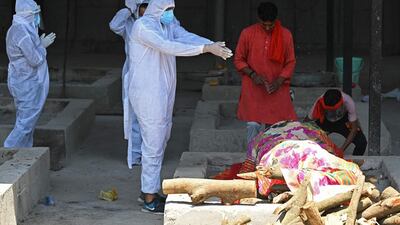India's Covid-19 death toll surpassed 300,000, making it the third country after the US and Brazil to hit the figure.
The South Asian nation has been reporting record daily rises in infections and deaths in recent weeks.
The toll now stands at 303,720, after adding 50,000 deaths in just under two weeks.
The number of infections recorded since the pandemic began rose above 26.7 million, health ministry data showed.
In the past 24 hours alone, there were 4,454 Covid-19 deaths, the second-highest daily toll since Wednesday's record 4,529.
The number of deaths has continued to rise, even as infections fell in major cities, including New Delhi and Mumbai, where lockdowns have been imposed to stem the spread of the virus.
"Deaths always will lag cases... People who have been diagnosed with infection now will go into hospital, and then a small number of them will die but that will be later," Ashoka University biology professor Gautam Menon told AFP on Monday.
Many experts also believe the real toll is much higher, particularly as the disease spreads into rural areas where the majority of the 1.3 billion population lives and where health facilities and record-keeping is poor.
The wave has overwhelmed hospitals with patients, and also led to a severe shortage of oxygen and critical drugs. Harrowing images of long queues for funerals and makeshift pyres have also emerged from crematoriums and cemeteries.
Bodies of suspected Covid-19 victims have meanwhile been seen floating down the Ganges river or buried in shallow graves.
"We are seeing the bodies along the river Ganges which don't seem to be recorded as Covid deaths but are very likely to be Covid deaths," Mr Menon said.
"While everyone agrees that there is undercounting of deaths, the question is – what is the extent of the undercounting and has it consistently been a large figure, or has it only gone up... over the past three weeks to a month."
Experts say religious festivals and packed state election rallies held earlier in the year could have led to viral "superspreader" events. They say mass vaccinations are the only long-term solution.
India has administered just over 196 million shots since mid-January, but experts say the programme needs to be significantly expanded.
The country, home to the world's largest vaccine maker, has halted exports of vaccines to meet local demand.
Black fungus crisis
A rapid rise in cases of mucormycosis, also known as black fungus, has added to the challenges faced by India's healthcare system as it deals with a massive second wave of Covid-19 infections.
The disease has a close link to diabetes, and conditions which compromise the immune system. Experts have said that an overuse during the Covid-19 pandemic of certain drugs which suppress the immune system could be causing the surge.
Data from the US Centers for Disease Control and Prevention shows that mucormycosis has a mortality rate of 54 per cent, which can vary depending on the condition of the patients and the body part affected.
States across India have reported more than 5,000 cases of the otherwise rare disease in recent weeks, mostly in people infected with Covid-19 or recovering from the disease.
The disease is not contagious, which means that it cannot spread from contact between humans or animals. But it does spread from fungal spores that are present in the air or in the environment, which are almost impossible to avoid.
"Bacteria and fungi are present in our bodies already, but they are kept in check by the body’s immune system," said K Bhujang Shetty, head of Narayana Nethralaya a specialty eye hospital.
"When the immune system goes down because of cancer treatment, diabetes or use of steroids, then these organisms get an upper hand and they multiply," said Dr Shetty.













